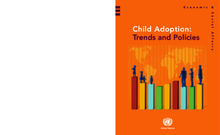Adoption is one of the oldest social institutions. Nevertheless, it raises highly emotive issues because of its fundamental implications for familial ties. Questions on whether adoptions serve the best interests of children, who should be able to adopt and the role of Governments in regulating such decisions are frequent subjects of debate. Yet, despite the heightened attention to these issues, much of the information on adoption remains anecdotal. Data on the number of children adopted domestically are rarely available and when they are, they tend to be out of date. Similarly, comparable information on trends in intercountry adoptions – that is, adoptions that involve a change of country of residence for the adopted person – is often lacking or is available for just a few countries.
The study provides a solid foundation for furthering research on child adoption and, more specifically, on the demographic factors that shape the demand for and the availability of adoptable children. The focus of the report is on the nexus between adoption policies and trends at the national and global levels. Understanding adoption policies and their origins is all the more important today because, as adoption has become global, inconsistencies among the legal principles and traditions regarding adoption in different countries are increasingly coming to the fore.

